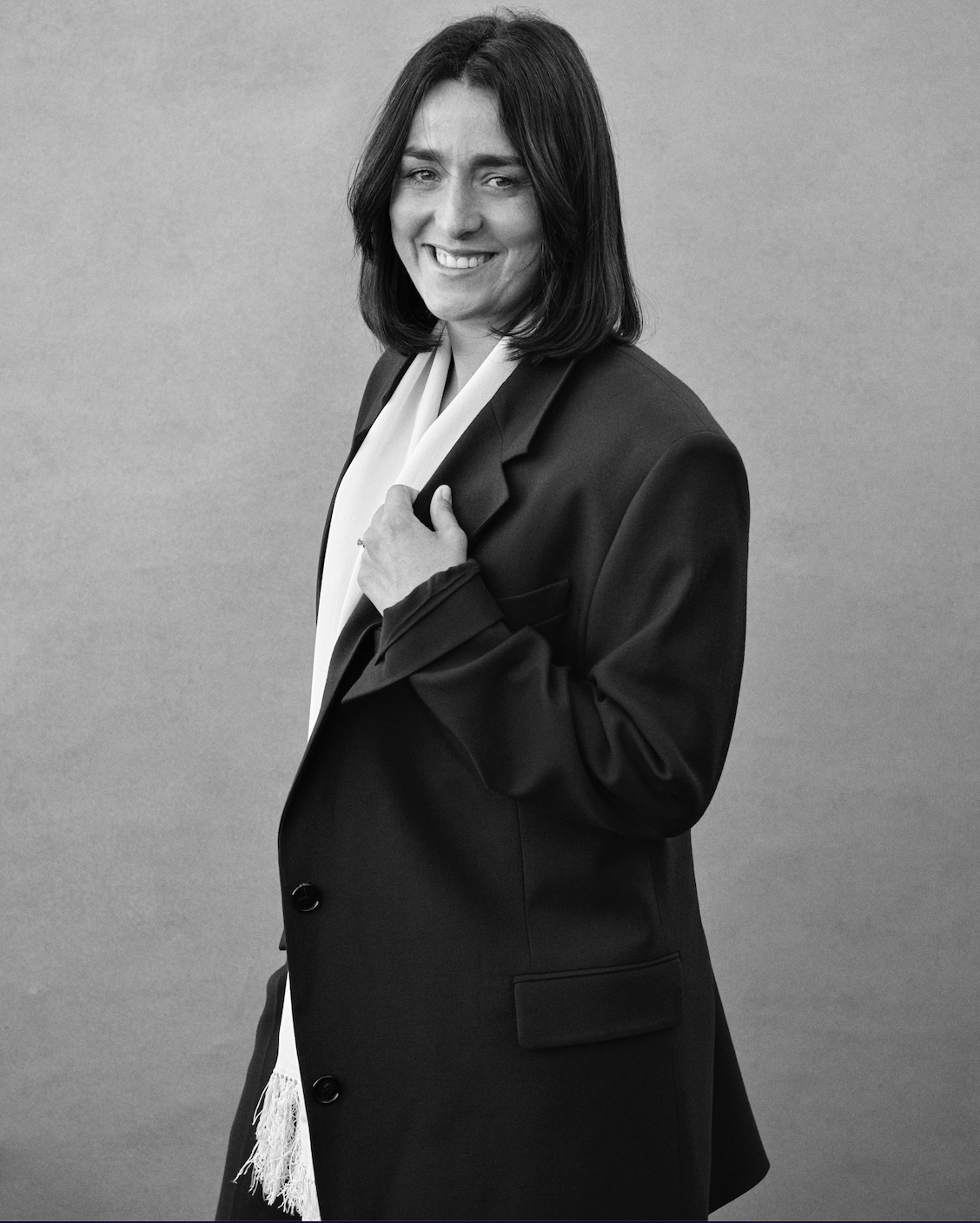Born in 1994 in Ksar Hellal, Tunisia, Ons Jabeur’s tennis journey has triumphed over challenges in a nation predominantly focused on football. Rising from hotel tennis courts with limited resources, she relocated to Tunis for better facilities. In 2011, amid the Arab Spring, she made history as the first Arab woman to win Roland Garros Juniors. Fast forward to 2022, and Jabeur achieved another milestone at Wimbledon, becoming the first Arab tennis player to reach a Grand Slam singles final in the open era.
Jabeur’s warmth and victories have captured hearts, offering hope to girls from the region to succeed in tennis. Beyond tennis, her influence resonates across various fields, earning admiration from people, royalty, actors, musicians, footballers, politicians, and celebrities throughout the world. Her uplifting demeanor earned her Tunisia’s “Minister of Happiness” title, reflecting her impact beyond sports.
Actively involved in establishing a tennis academy in Tunisia, Jabeur passionately supports humanitarian causes, showcasing her dedication to positive global impact. During Wimbledon, Jabeur pledged funds for each drop shot, contributing to the renovation of a school. Additionally, she auctioned her tennis racquets, with the proceeds supporting the enhancement of a hospital’s facilities. In 2022, Monaco’s Peace and Sport charity honored her with the ‘’ Peace Champion of the Year award’’ for her dedicated global peace advocacy. In November, Jabeur displayed her generous spirit by sharing a portion of her WTA Finals prize money to support the children of Palestine, emphasizing that it’s not a political message but one about humanity. Her goal is not just personal success but to provide hope and opportunities for as many people as possible.
As we witness her journey, we learn the true values of faith, generosity, and willpower. Ons Jabeur is not just a tennis champion; she is a champion of life.
Firstly, we would like to express our gratitude for giving us the opportunity to interview you. We hope that you have fully recovered from the injuries you experienced.
Thank you so much for your kind words. I appreciate the warm welcome. Fortunately, I have recovered well from the injuries I experienced. It was a challenging time, but I had an excellent support team, including medical professionals, trainers, and my own determination, which helped me through the recovery process. I’m feeling strong and confident, and I’m excited to be back on the court, giving my best in every match. Injuries are part of the journey for any athlete, and they teach valuable lessons. I’ve used this time to focus on my overall well-being and improve various aspects of my game. I’m ready for the upcoming challenges and grateful for the opportunity to continue doing what I love.
How do you handle the pressure of being a trailblazer and a global role model, with the world watching and people from your own country taking great pride in your accomplishments? How does this make you feel personally?
Embracing the role of a trailblazer and global role model is an honor and the pressure that comes with it is a privilege. The support from my country and worldwide is motivating. I handle the pressure by focusing on my love for the game and using my platform to inspire others. It’s a fulfilling journey, and ultimately, I aim to make a positive impact both on and off the court, and that’s what keeps me grounded and focused on the bigger picture.
Can you share some of the most memorable moments from your journey as a professional tennis player so far?
My journey as a tennis player has been marked by memorable moments. Winning my first WTA title in Birmingham, making it to the first Grand Slam final in Wimbledon and winning my other titles in Berlin, Madrid, Charleston and Ningbo will always stand out. Breaking barriers, setting records for the region, and feeling the global fan support have been highlights I will always cherish. Each match shapes my journey, and I’m eager for more memorable moments ahead, breaking more records and winning my first grand slam title.
Your playing style is known for its versatility and adaptability to different court surfaces. How do you approach training to excel on various types of courts?
I like to think that versatility is key to my playing style, I hate routine in everything so I try and have fun as much as possible. Training definitely involves adapting to various court surfaces through drills that simulate conditions. Working closely with my coach and he analyzes opponents’ styles on different surfaces and aim for a well-rounded game. Of course, consistent preparation ensures I can thrive on any court, leveraging my strengths and unexpected shots to destabilise the other player. I love angles and I do have a variety of shots in my arsenal; slices and drop shots, anything that will make the crowd goes crazy.
Can you talk about your training routine and the areas of your game that you’ve been focusing on to further enhance your performance?
Certainly! In my training, I prioritize fitness for endurance and agility. Strength training enhances my power and stability. Technical focus includes refining strokes, especially my serve, which hasn’t been great this year, and working on shot variety. Footwork drills adapt to different surfaces. Mental conditioning involves mindfulness and visualization. Tactical evolution includes experimenting with different game plans. The goal is continuous improvement across all aspects of my game for readiness in every tournament.
What challenges have you faced in your career, and how have you overcome them to continue progressing as a player?
Facing injuries and adapting to diverse playing conditions have been challenges in my career. Physically, working closely with my medical team is crucial. Mentally, I view challenges as opportunities for growth, staying focused on long-term goals. Learning from victories and defeats, maintaining a strong support system, and continuous adaptation are key. Additionally, coming from where I do, finding sponsors posed initial difficulties, but perseverance and dedication have played a vital role in overcoming those challenges.
What has been the most significant change in how you prepare both physically and mentally in recent years?
In recent years, the most biggest change in my preparation has been a profound emphasis on enhancing mental strength. I’ve dedicated a lot of time to mindfulness and visualization techniques, prioritizing mental resilience to remain composed under match pressure and adeptly navigate dynamic game situations. This intentional focus on mental strength has become a cornerstone of my preparation, significantly influencing my overall performance and approach to the game. Having Melanie by my side has also been extremely helpful.
Reflecting on your most recent final, what aspects do you believe were missing that could have contributed to your victory?
As I said many times before, that loss was definitely the most painful one of my career. But I’ll say this: I’m proud of how I took the time to recover from it. I’m not 100% recovered and that only means I’m human but I’m getting there and I know that next time, I won’t lose.
How do you balance the demands of professional tennis with your personal life and interests outside of the sport?
I think balancing professional tennis with my personal life involves effective time management and a strong support system. Communication and prioritizing relaxation and hobbies are key for me to maintain a healthy equilibrium between the demands of the sport and personal well-being.
Your empathy and charisma have made you popular both on and off the court. How do you explain your ability to connect with people so deeply?
Thanks! I think I’m just a simple person who likes to laugh and make other people laugh you know. I love life, I love people and I’m just me. I think people see through me, I’m not afraid of showing emotions and being genuine so I think that echoes with people.
How do you perceive your impact on sports and tennis in Tunisia? You have evolved into a national icon, igniting a fresh wave of enthusiasm for tennis in recent years, particularly among young girls. What are your thoughts on the future trajectory of the sport’s development in your country?
I view my influence on tennis in Tunisia and Africa as a chance to inspire the next generation. The future holds promise with increasing support. I anticipate improved infrastructure and opportunities for young talents, fostering the growth of tennis in Tunisia on the international stage. That’s why I’m launching the academy!
We understand that your documentary will be featured on Netflix. Could you share some insights about it? Additionally, what is your next major goal and what are your future plans?
The documentary will be on beIN’s TOD. I hope people will enjoy it; I do reveal quite a lot about myself in that documentary, including my upbringing, the past year, the tears of joy, and less happy times. For now, obviously, I’m focusing on the new season, but I’m also launching my Tennis Academy and my charity Foundation. I’m very excited about all of these new plans, but tennis remains my number one priority. Winning my first major title is crucial, and I want it to be the first of a long series.
Text By: Suna Ahmed




